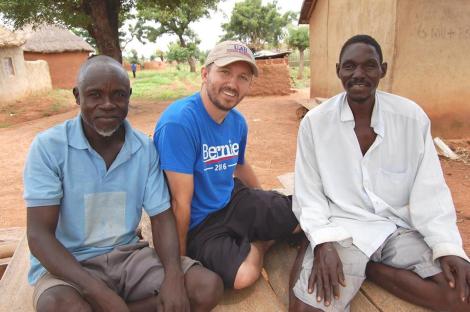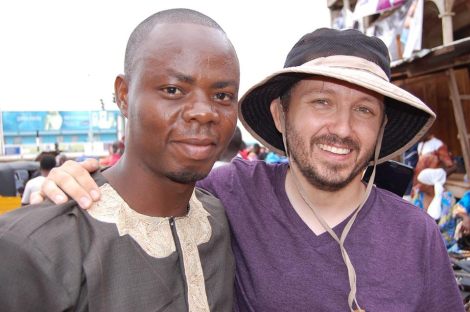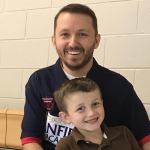By Warren Alan Tidwell
Humanist Service Corps Volunteer
We have arrived in Ghana for our year of volunteer work with the Humanist Service Corps. Leading up to my departure I researched West Africa extensively in order to prepare myself but I knew nothing could compare with being on the ground. I had studied the cuisine and learned of cultural faux pas to avoid but experiencing firsthand the differences in gender relations, for example, is not anything you can learn through an online FAQ or YouTube video. Men will ask to buy the woman you are walking with or sell their sister to you for marriage. Even though it can be in jest it’s an adjustment you have to make culturally and learn to handle appropriately. I thought I would have a much better idea of what to expect but I was wrong. It was like being dropped on an alien planet.

With the elders of the village, Palisy.
More than anything I have prepared myself mentally as it pertains to writing about my experience as a white man from Alabama working in a post-colonial African nation. I realize I have to take care with my words. Coming from an area of the United States with a tumultuous history of race relations, I carry that history and a tinge of guilt, right or wrong, with me. I will strive to compose a fair account of my time here while making an effort to not be flippant with my words.
In our first days in Ghana, reports of unarmed black citizens being killed by police in the United States were coming in as well as retaliatory attacks on law enforcement. It seemed a new report was coming out every day and there was a feeling within me of watching my country burn down from 5,000 miles away. In Ghana there were news stories on the buses and every television was dominated by news reports of the conflict between African Americans and the police in the United States. I was forced early on to accept that my race made me stand out in a country where there are very few white people. Ghanaians often looked to me for answers on the problems in the United States as I was often the only white person around.
As a supporter of the Black Lives Matter movement, it was quite interesting to see the views of my country and the movement itself by a country filled with blacks.
In Ghana I have been told by citizens the most serious issue affecting Ghanaians is the problem with rolling blackouts where electricity will be shut off to an area for hours at a time. Within hours of landing here I watched the BBC News with Michael, a member of the Humanist Association of Ghana. It detailed the shooting of an unarmed African American man in Louisiana. Michael told me about the rolling blackouts, or what Ghanaians call dumsor (off/on) and compared it to the problems the United States. “We may be asleep at night and the power goes off but we are alive,” he said.

My dear fried, Ali Mohammad, a devout Muslim.
I will never claim to have any idea of what the black experience is in America but, for the first time in my life, my race defines me above all. Being the only white person in many situations it feels like my skin is glowing. No matter where I go a judgement good or bad is made immediately because of the color of my skin. I have been shown nothing but kindness in Ghana and it is still uncomfortable at times.
I can’t imagine how uncomfortable and maddening it would be knowing the people looking at me are thinking I’m a criminal or up to no good.
I’ve never had to mentally prepare myself for interactions with others because my race set me apart. It’s exhausting at times but it’s been a valuable experience that has given me a very small taste of what life is like for my fellow American citizens every single day- and again I haven’t experienced the first negative reaction. That’s the thing that worries me for African-American citizens in the US. It goes so much deeper than that. Many of my fellow citizens experience negativity and suspicion and, to be completely frank, I’m not sure how I would handle it.
I think this experience would be good for a number of US citizens for a myriad of reasons. More than anything it humanizes another culture- predominantly black and muslim- that is often demonized in American media. I’ve managed to make close friends here who hold very different views of the world than I do. We see the value in the humanity of the other person and we enjoy the time we spend together. It’s learning lessons firsthand like this that kills prejudice, hatred and fear for the unknown.
I know I’ll continue learning from my experiences here. I’ve certainly learned a lot from it so far.
